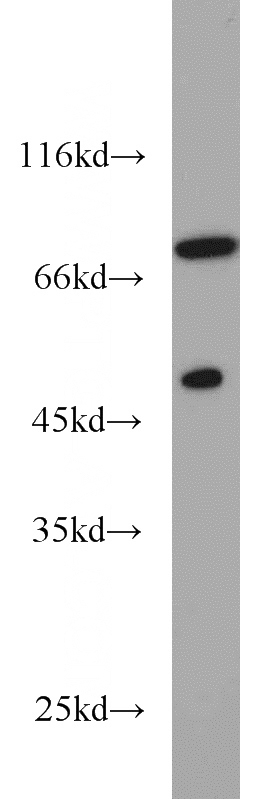-
Product Name
GTF2F1 antibody
- Documents
-
Description
GTF2F1 Rabbit Polyclonal antibody. Positive IP detected in K-562 cells. Positive WB detected in K-562 cells. Observed molecular weight by Western-blot: 74 kDa
-
Tested applications
ELISA, WB, IP
-
Species reactivity
Human,Mouse,Rat; other species not tested.
-
Alternative names
BTF4 antibody; GTF2F1 antibody; RAP74 antibody; TF2F1 antibody; TFIIF antibody; TFIIF alpha antibody
-
Isotype
Rabbit IgG
-
Preparation
This antibody was obtained by immunization of GTF2F1 recombinant protein (Accession Number: NM_002096). Purification method: Antigen affinity purified.
-
Clonality
Polyclonal
-
Formulation
PBS with 0.1% sodium azide and 50% glycerol pH 7.3.
-
Storage instructions
Store at -20℃. DO NOT ALIQUOT
-
Applications
Recommended Dilution:
WB: 1:500-1:5000
IP: 1:200-1:1000
-
Validations

K-562 cells were subjected to SDS PAGE followed by western blot with Catalog No:111230(GTF2F1 antibody) at dilution of 1:1000

IP Result of anti-GTF2F1 (IP:Catalog No:111230, 4ug; Detection:Catalog No:111230 1:300) with K-562 cells lysate 4000ug.
-
Background
In eukaryotic systems, the initiation of gene transcription involves the ordered assembly of a multiprotein complex on proximal promoter elements, consisting of RNA polymerase II and broad families of auxiliary transcription factors. Such factors can be divided into two major functional classes: the basal factors that are required for transcription of all Pol II genes, including TFIIA, B, D, E, F and H; and sequence specific factors that regulate gene expression. The basal transcription factors and Pol II form a specific multiprotein complex near the transcription start site by interacting with core promotor elements such as the TATA box generally located 25-30 base pairs upstream of the transcription start site. TFIIF, a heteromer composed of a small (RAP 30) and a large (RAP 74) subunit, acting at an intermediate stage in initiation complex formation, binds directly to RNA polymerase II in solution and decrease the affinity of RNA polymerase II for nonspecific DNA. In addition, TFIIF stimulates transcription elongation by RNA polymerase II.
Related Products / Services
Please note: All products are "FOR RESEARCH USE ONLY AND ARE NOT INTENDED FOR DIAGNOSTIC OR THERAPEUTIC USE"
